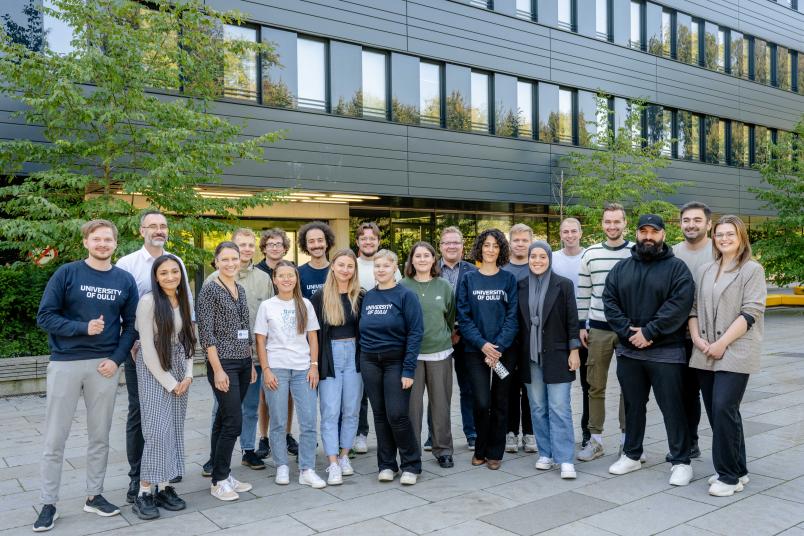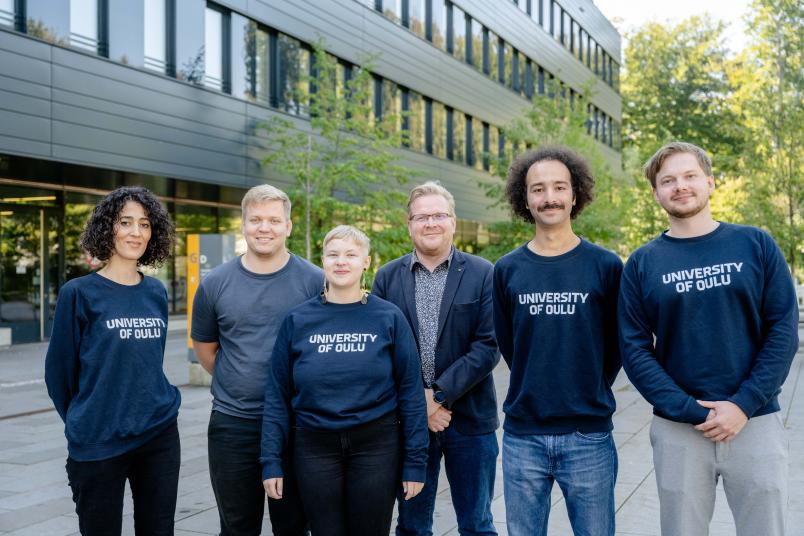Summer School
The Finnish view of Bochum
European cities are facing major challenges. The UNIC Summer School focused on the smart city strategies developed by Oulu and Bochum.
Five days were dedicated to the two cities of Oulu and Bochum. Under the title "Smart City Concepts in Oulu & Bochum: Solutions to Pressing Urban Challenges", the Faculty of Economics invited students from the UNIC partner university Oulu to Bochum for the first time. From 11 to 15 September 2023, the students discussed pressing urban challenges, such as climate change, and compared smart city concepts. Initiators of the Summer School were Prof. Dr. Michael Roos from the Chair of Macroeconomics at Ruhr University Bochum and Prof. Dr. Jaakko Simonen from the Oulu Business School at the University of Oulu. The project was set up in cooperation with the Smart City Innovation Unit Bochum.
Arya Yaghoubi has just started his master's degree in Information Processing Science at the University of Oulu; Anni Niemelä is about to graduate in Marketing. In the interview, the two talk about how the Summer School manages to go beyond theory and why riding a train in Finland is a very different experience than in Germany.

I found smart cities to be a very interesting topic, as it is currently very important for cities.
Arya Yaghoubi
Why did you decide to participate in the Summer School?
Arya Yaghoubi: For me, the most interesting thing was that I got to travel to another university and another country for the UNIC Summer School. I love traveling and learning something new. Plus, I found smart cities to be a very interesting topic, as it is currently very important for cities.
Anni Niemelä: I really liked the interdisciplinary aspect, having different students from different majors. That was a big plus for me, even though I am a marketing major and museology minor. It was cool to have that diversity.
What exactly did you do at the Summer School?
Arya: We looked at the development of smart city concepts. In the process, we discussed how the cities of Oulu and Bochum are dealing with pressing challenges. We exchanged ideas with the other students and developed new ideas in groups to present to the city.

One of the biggest challenges for both cities is the demographic change of an aging population.
Anni Niemelä
Do Bochum and Oulu face similar urban challenges?
Anni: Both cities have a very similar history. It was therefore very interesting to compare how things have developed in Oulu and in Bochum. One of the biggest challenges for both cities is the demographic change of an aging population. Not enough children are being born and the elderly population is growing. So, we have to find solutions on how to organize our health care and retirement. Another problem is the mismatch between qualifications and vacancies: there are many vacant apprenticeships that no one wants to apply for, for example in care. On the other hand, there are people with qualifications for whom there are no suitable vacancies.
Arya: Exactly, and I can say that climate change is one of the biggest challenges that both cities are dealing with. Both of them are working to address these problems and I know it takes a lot of time and costs a lot of money.
Is there anything that surprised you about Bochum?
Arya: I noticed a lot of cultural differences. For example, when you get on the bus or subway in Finland, people will keep at least one or two meters apart. But here, everyone sits right next to each other. That was very interesting. Also, I saw a lot of international people in Bochum. In Finland, you can only see that in Helsinki, but not in other cities. And that really makes me feel good. I also saw a lot of historical places and I could feel the prestige of the city.
Anni: It was funny what you said about the distance because that also applies to the cities. German cities are so close together, whereas here in Finland, it can take you hours to get to the next city. We are used to having these longer distances, so it is crazy that there is another big city only fifteen kilometers away.

I was especially impressed by the diversity of the students.
Arya Yaghoubi
What impressed you most during the five days of the Summer School?
Anni: How much we were able to achieve in such a short time. I think that coming together and mixing the groups so that we had students from Bochum and Oulu collaborating in different groups was a good approach to working. At the end of each day, we presented our results. I think that was very effective.
Arya: I was especially impressed by the diversity of the students and that we all got along well from the first day. It was a wonderful time and I hope to see my new friends again in the future – maybe in Oulu.
What would you say is the most important task for both cities?
Arya: I think cities really need to be agile and change as quickly as possible. Sometimes bureaucracy makes change processes more difficult.
Anni: First of all, we have to address climate change and the crises it brings. Even in Oulu, we sometimes have thirty degrees in the summer. So how can we even have a smart city in the future? It will be of no use if the planet becomes uninhabitable.
Why is an international Summer School worth attending?
Anni: I can recommend attending a UNIC Summer School to everyone. Of course, it is nice to have a change of environment from regular university classes or even online classes. We visited places in Bochum and exchanged ideas with local authorities, which made the whole topic much more tangible. One word that we used a lot during the week was 'resilience'. That will stay with us.
Arya: I will also tell my friends about the Summer School and recommend they check out the website. Not only did I meet a lot of nice people in Bochum, but I really learned something. Something that is not just theoretical, but that I will use later in life.

